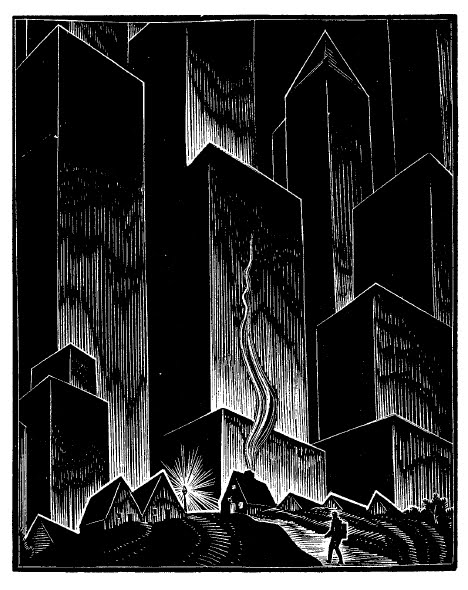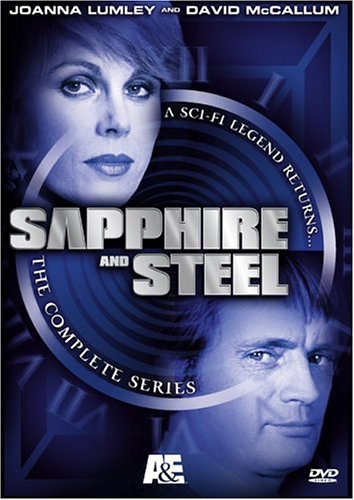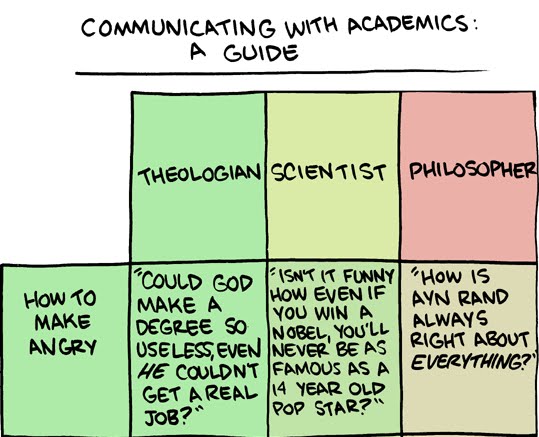2010: Week 41 Blots
BLOT: (17 Oct 2010 - 10:18:41 AM)
Library of America releases Lynd Ward's Six [wordless] Novels in Woodcuts. Worth checking out...
It is weird to think of books with no words as being literary, but the wordless novels of Lynd Ward count. There are plotted out, show structural themes and twists, have character development and pathos. The story is accomplished through black and white woodcuts [ink stamped by carved wood, allowing for single-tone images but often involving a number of shading techniques, see Wikipedia for more], with elements ranging from surreal scenes heavily influenced by silent films (see graphic below for a

Just to highlight the capabilities of the wordless novel, we'll take a quick look at
Ward is not trying to dig deep with this one. He was the son of a Methodist pastor and he went on to help several Methodist influenced political causes around the time of the Great Depression. He paints the story of a country innocent, not so much caught up in the debauchery of the city—or should I say, The City?— but mostly unable to realize what the debauchery of the city is until it is too late. He flees in the end, but he brings death with him. It is the inherent goodness of man hiding out under the sin, but only surfacing after depravity is reached. Modern readers might balk at the solution to all the man's problems being to find a quiet, blonde wife in the country-side. At least the ending brings the novel's only complex plot point: we can overcome our personal evils, but there is still a price to pay. Ward's artwork is the highlight throughout, some scenes being filled up wit imagery and concepts, and onthers focusing on only a couple. He is not in the same vein as some of the woodcuts most often displayed in textbooks and such, he opts for something simpler and more stark—more Frans Masereel than Gustave Doré—but there is still plenty of food for the eyes. A few pages fall into the narrative cracks, not quite making sense in the overall arch of thing, but the majority are more than functional. He takes a story that would have been a trite novella if written in words, and make it much more beautiful without them.
In something like a bonus, I came across this page on Lynn [sic] Ward from Texas Chapbook Press. Despite the name being wrong, it gets the number of wordless novels wrong, and claims the allegorical
TAGs: Books
BY WEEK: 2010, Week 41
BY MONTH: October 2010
BLOT: (16 Oct 2010 - 01:41:01 PM)
Sapphire & Steel (Assignment One)
It begins with a British school boy, on somewhere that requires a ferry to reach, doing his school work at a kitchen table, surrounded by clocks. Then all the clocks stop. By the end, it has involves the boy and his sister, their missing parents, soldiers who apparently killed a little girl back during Cromwell's days, and three agents working on behalf of an unknown, but elemental themed, agency. Sapphire (Joanna Lumley*) and Steel (David McCallum)—the eponymous duo—are backed, eventually, by the large and jovial Lead. Each has his or her own power, though the exact limits of which are only barely touched upon, and they are battling unknown beings from the "Time Corridor" who have been kidnapping people for various unknown reasons. These temporal beings, represented in our world only as illusion and as pools of light, are using nursing rhymes to invoke past times in the house, and making those past times traps and doorways. It does not make much sense, except in a way that makes you think are almost, but not quite, getting the picture, and that is

The show is different from what you would expect if someone said to you, "Ok, British SF, low budget, involving aliens and time travel [sort of]". We have a vision in our mind. If we don't zoom straight to
It has flaws. The little girl, Helen, played by Tamasin Bridge, regularly acts less human than Steel. Smiling at weird scenes, crying disaffectedly, speaking in a strange stilted lisp. Several bits of her dialogue are flat out ignorable (which is good, since they were so hard to understand with her "cutesy" voice). Steven O'Shea, playing the older brother, Rob, is miles better as a child actor. There is a couple of scenes where the monsters pretend to be the children's mom. Those work. One, the face is elongated by a shadowy blur technique. The other, her eyes are wrong and mis-irised. Both of those are creepy, but then most of the monstrous visitations are patches of light running around on the floor. Somewhat bizarrely, they don't appear to be just flashlight beams for cheapness, but actually superimposed after-fact unto the shot, meaning that they were intended to look like flashlight beams on the floor while being more difficult to achieve. Oh, and the wonderfully exuberant Val Pringle, while playing Lead, has a few scenes in episodes five and six where he is comforting young Helen, but her fugue-state eyes and his wide eyed grins transform it into snapshots from a disturbing after-school special. Staged and dialogued perfectly earnestly—Lead's speciality seems to be taking the edge off a situation and keeping spirits up—it still had a dozen ways it could have been shot less creepy.
If flaws are compared to pluses, though, the pluses will win. This a show that doesn't play by the rules. There are no easy answers. Good guys play by a different sort of ethics altogether than the people to whom they are being good guys. Flash and pomp are always underscored by menace. The utter sparseness of sets and scenes, sticking to one well realized house, adds to the flavor instead of taking away. Makes it more nightmarish. If they could go outside, then they could escape. The weird tension between Sapphire and Steel, and the odd not-quite-human responses of Lead...it's a lot of weird, good stuff. And the underlying evil, especially, comes out. About five lines of dialogue being changed would have set this fully into the horror category, but horror is another genre that it skirts around, borrowing from, but refusing to settle fully into.
I have not seen the other "Assignments", yet, but from what I've read, it appears they dropped some of kids-show traps: children acting as viewer-by-proxy, certain cutesy aspects. This can only be a good thing. I am curious to see how much they explain, if they do explain much at all, how it changes the flavor of the show. For now, I'll rank it Good and recommend it to anyone who read my description above and went "hmmm".
* For any
TAGS: Television
BY WEEK: 2010, Week 41
BY MONTH: October 2010
BLOT: (14 Oct 2010 - 01:17:30 PM)
[Poem] "I Say Expat Like It Was the Easiest Yarn in the World to Weave"
I say expat Like it was the easiest yarn in the world to weave : Gold leaf and a quick needled Pattern laid out and flapping in the indoor breeze. The window left open and maybe we'll just close it and it as simple as that. Like it is all wine and roses And unheard of dark chocolates In some land, distant, but not more than a few thousand miles away because you walk far enough you end up where you started but that's boring and trite. Really, I do not know Why I am so obsessed with Africa, the Teak colored Mahogany, South America and exotic smells, the Capes of this or that and distant schoolyards. Asia and its different but the same shopping miles particularly practical in various esoteric philosophies. Europe with their old capitals and long afternoons, tea and rhyme and things. But not, in too many ways, specific enough to be NOTHERE or NOTNOW And maybe that's what I'm afraid of. I don't think I would fit in, with the world, I barely fit in here, Just a big boned boy with no real dance moves, Something like a stutter, but not even that. Can't barely hold a beat or fold small talk Into appropriate shapes and long ago, I sold my soul for a bucket of curiosity. Spend all day with the ghosts of literature And of science And of philosophy And of pipe smoke. I have slotted into this living with the passion of least resistance and paths like bamboo thickets at the bottom of respective gravity wells And rolling like a ball through The all about, madly in love with this or that EVERYDAY and my own Unique. What would be the point ELSEWHERE, When everyone is given to be unlikely? When the clouds form other shapes, and mothers have Other names, and days are longer or shorter, or just the same?
TAGS: Poetry
BY WEEK: 2010, Week 41
BY MONTH: October 2010
BLOT: (14 Oct 2010 - 10:57:56 AM)
How to make a philosophy academic angry...
Zach Weiner takes a lot of swipes at philosophy types in Saturday Morning Breakfast Cereal, so as you might expect a fair number fall flat. Philosophy major jokes are a little like abstract art: occassional flashes of brilliance can quickly be overridden by cheap attempts to channel the muse. To date, the only one that has struck me as fully funny was the one about why philosophers are no longer allowed at environmental conferences. Heh. Then, today, he made a chart of "Communicating with Academics: A Guide" and the first line, "How to Make Angry", is golden for both the Theologian and Philosopher (click pic below to see full comic):
BY WEEK: 2010, Week 41
BY MONTH: October 2010
BLOT: (11 Oct 2010 - 11:24:29 AM)
Coincidence, synchronicity, and other things going bump, together, in the night...
I meant to post this a week or two ago. It started with separate coincidences. The first. I was reading a novel from the 90s back around the end of September and I noted a strange word, "argy-bargy". From context, it was pretty obvious that it meant "argument". Then, less than a week later, I was playing a "talking book" written this year, and in one scene, there was again the use of the word argy-bargy. How many times has that happened to you? The second bit. I was reading Cracked.com's article, "6 Romantic Movie Gestures That Can Get You Prison Time," when I came across the phrase—in #5—"rape by fraud". I wouldn't say it is a unique phrase, and I can immediately grasp what it is getting at. But then, about two days later, saw this linked to on Fark.com: "Girl Poses as Man for 6yr Fling". With the strange circumstances put to a side—how exactly do you convince someone you are having sex with that you are of another gender?*—this was another case of coincidence. I read about "rape by fraud" just a couple of days before seeing a news article about it.
My friend Raymond and I have joked about it quite a bit. He once posted about the very phenomenon I am talking about, hearing a word once and then the next day: hearing it again. It was a few weeks later, in the mall, that we were talking about Drew Barrymore when a huge wall poster featuring her (not sure the use of such a thing) was carried right by the door of Book Gallery. Let's call that the speak of the devil coincidence. What else is there? You have things like un/lucky numbers and colors. You wear a green shirt, and meet the woman of your dreams. You walk into a green door, and find $100 just lying on the ground. You pick the green scratch card, and win a vacation. However, whenever you wear red or otherwise choose red, something bad happens. I've seen people do the same thing with numbers, where a certain number of steps or dumplings is good, but one less is bad.
There are lots more examples of the phenomena, but it won't really help my point to list them all. What I am curious about is explaining them, if you can do such a thing. There are several explanations, which I will list from the crazier and/or more divine, down to the more practical and, you might say, more boring.
- The Paranoid Explanation: "Something is up. The universe, or some agency, is actively organizing the coincidences to mess with me. This is why I notice them and others don't, because they are aimed at me?"
- The Controlled System Proof Explanation: "Coincidence is just proof that I live inside of some controlled system [e.g., The Matrix] and its programming creates little swirls from time to time."
- The Divine Sign Explanation: "God is trying to get my attention."
- The Jungian Collective: "The Collective Unconcious is just expressing itself."
- The Not-Quite Jungian Explanation: "Various memes and ideas are organizing under a loose density wave equation."
- The Finitude Explanation: "There's just not that much stuff to go around, eventually some of it loops back on itself."
- Statistics, aka The Pascal's Triangle Explanation: "The number of pairs between units of a set increases geometrically faster than the number of units [3 units has 3 pairs, 4 units have 6, 5 unites have 10, 6 has 15, etc]. Therefore, in a significantly large body of units, apparent coincidence amongst the many, many sub-characteristics will approach certaintity over time."
- The Translation Bias Explanation: "Your brain 'translates' fuzzy concepts and ill-fitting data into discrete categories. What you call a coincidence is really you rounding up one factor and rounding down another so they fit into the same category."
- The Recency Explanation: "As you witness/experience millions and billions of event, over time, the most recent will stick in your mind. When you see two events with similar characteristics in something of a recent time, it sticks out.
- The Common Interest Explanation: "We tend to hang around others with common interests, therefore things which will seem like coincidences are actually just everyday group dynamics."
- The Sensitivity Explanation: "We are more sensitive to certain words and ideas. We look harder for them to occur than others." [In other words, if your favorite number is 5, you are going to be more aware of it than other words, making it seem to show up more.]
I am sure there are others. How about you, how do you resolve coincidence and synchronicity? Something different from above? I am somewhere between the bottom half. I think that things involve a mixture of density waves (in the entry linked, I discuss them in academic settings), as well as a case of large-number pairs, recency theory, translation/confirmation bias, group dyndamics, and sensitivity. This makes me somewhat boring, but it comes down to two things I consider true about the universe and us in it: a) lots of stuff happens and b) our brain is made to compress lots of stuff into a couple of lines of usable data. Mix this in with "stuff happening" being pre-sorted by groups-of-belonging and you increase the likelihood of smoething showing up that just doesn't seem explanable. Then again, you get those really weird ones, like these mentioned by today's articles on Cracked.com (something of a coincidence that made go ahead and finish this article), and sometimes you wonder. I don't really wonder, I'm pretty set in my boring ways with the whole "really large numbers" theory, but there you go. Makes some of us wonder.
* I know at least one of you went "carefully".
TAGS: Matters Probabalistic
BY WEEK: 2010, Week 41
BY MONTH: October 2010
Written by Doug Bolden
For those wishing to get in touch, you can contact me in a number of ways

This work is licensed under a Creative Commons Attribution-ShareAlike 3.0 Unported License.
The longer, fuller version of this text can be found on my FAQ: "Can I Use Something I Found on the Site?".
"The hidden is greater than the seen."


